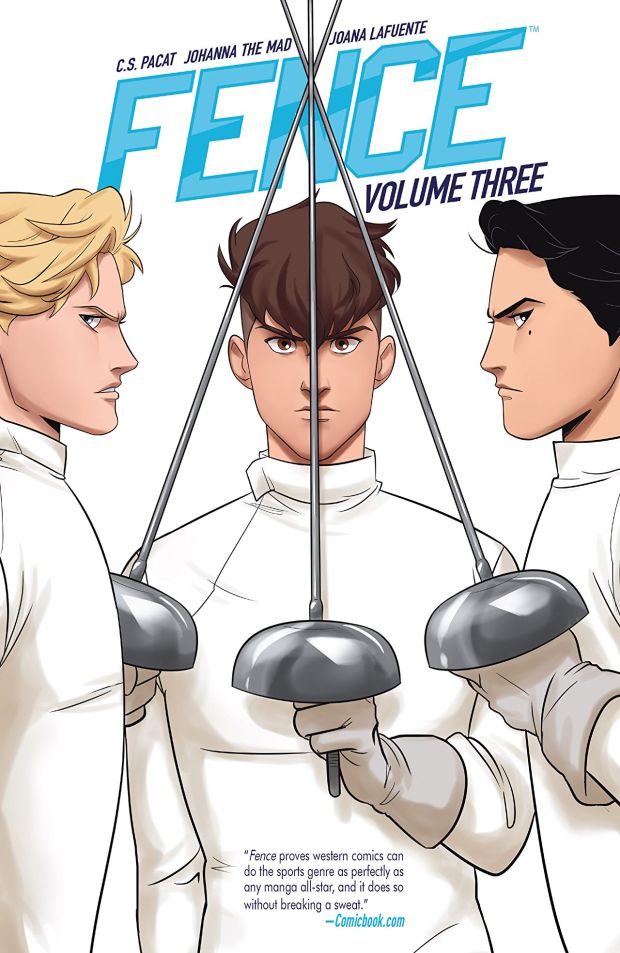by C.S. Pacat, Johanna the Mad, & Joana LaFuente
collects Fence #9-12
volume one | two | three | four
Okay, I’m seeing a lot of five star reviews on Goodreads and…I clearly liked this volume far less than everyone else. Hear me out, folks.
Fence’s third volume concludes the fencing tournament, determining the three coveted spots on the school’s fencing team who will then set their sights on the championship. The outcome of the tournament also decides if Nicholas can keep his scholarship and spot in the school – everything depends on whether or not he can defeat not only the upperclass students, but also his rival/roommate/definite love interest, fencing prodigy Seiji.
All of these big moments in volume three, which the first two volumes have been building up towards, should be highly emotional and have a satisfying payoff for the reader. However, my biggest complaint for the last two volumes was that Fence focuses so much on fencing and only fencing that the relationships and character development suffered. This was especially poor in volume two that only focused on fencing matches over a twenty four hour period.

Granted, this volume does have a few moments that brings the attention back to its characters. The fencers’ families visit to watch the final day of the tournament, and while it’s nice to see them and their relationships with their kids (or see who doesn’t show up), it’s missing the emotional punch for most of the high schoolers we’ve barely spent any time with. (And some, like Aiden’s much younger stepmom, seemed a little too on the nose.) There’s also one nice scene with a few students that actually takes place outside the fencing hall (I won’t reveal due to spoilers), but similar to the family aspect, it feels like too little too late. These kinds of moments needed to happen sooner in order for this volume to really land emotionally – who gets cut, who tries to sacrifice their spot for another student, and so on. Senior student Kally fights for his memories on the team outside of fencing – and we see some of those in Polaroid snapshots – it would have been nice if Pacat had let us in more (showing and not telling, like she did here), to both feel the sadness that the original team might be broken up, while still cheering for Nicholas to win.
Nicholas also takes a dramatic emotional turn that is not only surprising, but feels out of character. SPOILERS REST OF THIS PARAGRAPH. Nicholas understandably feels empathetic that, like him, Seiji doesn’t have any family come to visit, and perhaps he calls Seiji his friend in order to feel less alone. But it still seems strange after two volumes of obsessively hating Seiji, his rival and roommate, that Nicholas suddenly comes around. For the core relationship in the book, this needed far more progression and care to make sense. That being said, Nicholas is still extremely one-note about winning the championship and defeating his half brother Jesse, the highest ranked high school fencer. Of course, this is a sports story, but characters should still have more dimensions to them than that.

This brings us to the queerness of the book, and aside from Aidan’s match against his ex and Kally’s two moms, there’s very little in the book, which is extremely disappointing. Seiji and Nicholas have a fight in a supply closet, drawing some wonderful side eye from Aidan, but in a later panel the two clearly have no idea queer relationships exist – somewhere between amusing and outrageous. A book can only hint at queerness for so long until it becomes all about tension and not about relationship – and that’s not only not fair, it does a disservice to queerness in comics itself. It’s also a shame that Bobbie, Nicholas’ friend who presents feminine, is basically sidelined in the whole book to simply be Nicholas’ support, aside from one short scene featuring his cute abuela – still not about Bobbie, though. Speaking of which, my gripe last volume that the two female coaches, Sally and Lewis, are nothing more than talking heads continued this volume. At this point they are simply conduits for the boys’ success and not really their own characters.
Finally, Johanna the Mad’s art takes a dip this volume, and several panels were a little less cared for and seemed rather rushed. I wonder if this book was rushed to print due to the massive demand for more Fence, which is of course a great problem to have, but it was sad to see some of the art quality sacrificed for it.
Due to its popularity Fence has become an ongoing series rather than a limited one. I wonder at what point this change happened, because Fence seemed rather happy to take its time in fence matches rather than focus on character. I don’t think I’m going to stick around for it after this volume.

3 comments